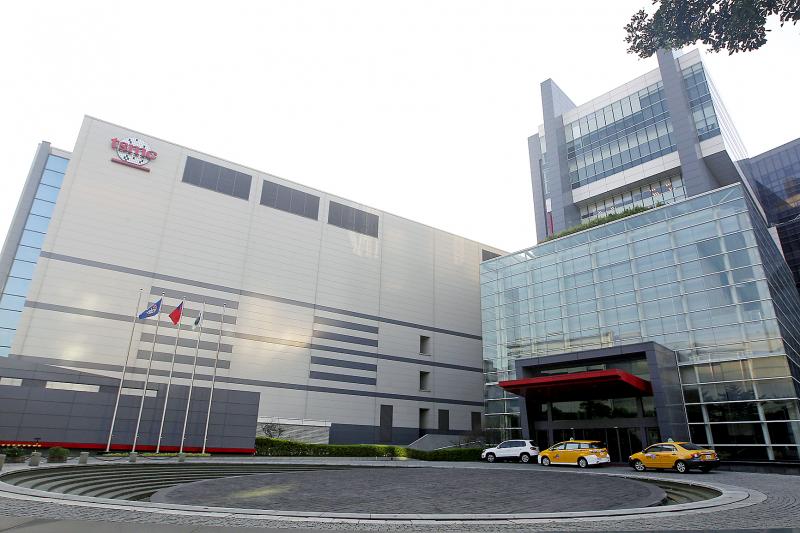As much as the US pines for the good old days of global semiconductor supremacy, Japan feels its loss of glory even more.
Once a dominant name in electronic components, the nation has been overtaken by Taiwan, South Korea, and, more recently, China. Yet Tokyo might have a viable plan to revitalize its domestic sector.
“Unlike the purely domestic, independent way it was done in the past, I think we need to cooperate with overseas counterparts,” Akira Amari, a former economy minister and senior member of the ruling Liberal Democratic Party, told Bloomberg News’ Isabel Reynolds and Emi Nobuhiro this week.

Photo: Pichi Chuang, Reuters
That is remarkable pragmatism for a country whose industrial policy has largely revolved around protecting and isolating its companies to preserve national identity. Yet three decades of decline show that past policies are just not cutting it.
In 1988, Japan commanded 50 percent of the global semiconductor industry, according to a presentation this month from the Japanese Ministry of Economy, Trade and Industry that cited data from research firm Omdia.
Back then, names such as NEC Corp, Toshiba Corp, Hitachi Ltd and Fujitsu Semiconductor Ltd occupied six of the top 10 places in market share, alongside US giants Intel Corp and Motorola Solutions Inc.
By 2019, Japan accounted for 10 percent. The US had climbed to 50 percent, due to the ascent of chip designers like Qualcomm Inc, Nvidia Corp and Advanced Micro Devices Inc.
These US firms rose thanks to a bifurcated business model aided by Taiwan Semiconductor Manufacturing Co (TSMC, 台積電), an anchor tenant in Taiwan’s noted science parks. The arrangement reflects complementary skill sets. Rather than both design and manufacture a chip, as was once the case, most US companies now just outsource to foundries like TSMC.
Amari said that TSMC is exactly the type of foreign partner that Japanese companies should work with, since it is the world’s largest maker of non-memory semiconductors.
His words carry weight, given that he is heading a party working group on chip strategy as part of Japanese Prime Minister Yoshihide Suga’s policy to incorporate industry plans into the government’s growth plans.
Japan remains a global leader in the equipment and materials used for production. As chips get increasingly more difficult to make, tighter integration across the supply chain is inevitable.
Taiwanese companies, including TSMC and United Microelectronics Corp (聯電), have a lot to offer.
The Taiwan-Japan relationship is also becoming one of the closest in East Asia. Tokyo last week donated 1.24 million doses of much-needed COVID-19 vaccine as Taipei struggles to contain an outbreak. They share close trade, cultural and tourism ties, and feel increasing economic and military tensions from Beijing.
The idea of semiconductor cooperation is not without precedent. More than a decade ago, Yukio Sakamoto, president of Japan’s then-largest memory chipmaker, Elpida Memory Inc, tried to rally together a consortium of local and Taiwanese companies to battle against industry giants Samsung Electronics Co and Micron Corp.
Japan’s semiconductor sector was already on the slide. Elpida was formed by the merger of memory divisions from NEC and Hitachi in 1999, a time when the nation’s share had already fallen below 30 percent.
Sakamoto did not think that either the Japanese or Taiwanese firms could survive on their own.
“We don’t have the scale,” he said in 2010.
Sakamoto’s proposal fell through amid opposition from Taiwanese companies and political pressure in Taipei. Within two years, his company had filed for bankruptcy and Taiwanese rivals largely exited the computer memory industry.
The mood is vastly different now. TSMC in February said it plans to set up a Japan research center primarily centered on materials development so that it can tap into the nation’s deep pool of chemical engineers.
The ministry hopes to take it further, and expects to offer strong incentives to lure a foreign chip foundry to Japan, Kazumi Nishikawa of the ministry’s IT Industry Division told Bloomberg News.
Politically, both governments are crucially aware of the need to cooperate, and jointly work with the US, to hold off China’s rising strength.
Chinese companies have increased their share of Apple Inc’s orders, a benchmark for the global electronics supply chain, and Beijing is willing to spend as much as it takes to ensure its chip industry gains traction.
Not content with being the king of chip design, the US now sees lack of manufacturing capacity as a threat to national security. Washington is looking to spend more than US$30 billion to get back in the game, increasing the urgency for other nations to cement their own plans.
With semiconductors becoming a key weapon in the technology cold war, Taipei and Tokyo would be smart to team up.
Tim Culpan is a Bloomberg Opinion columnist covering technology. He previously covered technology for Bloomberg News.
This column does not necessarily reflect the opinion of the editorial board or Bloomberg LP and its owners.

South Korea’s equity benchmark yesterday crossed a new milestone just a month after surpassing the once-unthinkable 5,000 mark as surging global memory demand powers the country’s biggest chipmakers. The KOSPI advanced as much as 2.6 percent to a record 6,123, with Samsung Electronics Co and SK Hynix Inc each gaining more than 2 percent. With the benchmark now up 45 percent this year, South Korea’s stock market capitalization has also moved past France’s, following last month’s overtaking of Germany’s. Long overlooked by foreign funds, despite being undervalued, South Korean stocks have now emerged as clear winners in the global market. The so-called “artificial intelligence

CONFUSION: Taiwan, Japan and other big exporters are cautiously monitoring the situation, while analysts said more Trump responses ate likely after his loss in court US trading partners in Asia started weighing fresh uncertainties yesterday after President Donald Trump vowed to impose a new tariff on imports, hours after the Supreme Court struck down many of the sweeping levies he used to launch a global trade war. The court’s ruling invalidated a number of tariffs that the Trump administration had imposed on Asian export powerhouses from China and South Korea to Japan and Taiwan, the world’s largest chip maker and a key player in tech supply chains. Within hours, Trump said he would impose a new 10 percent duty on US imports from all countries starting on

Chinese artificial intelligence (AI) start-up DeepSeek’s (深度求索) latest AI model, set to be released as soon as next week, was trained on Nvidia Corp’s most advanced AI chip, the Blackwell, a senior official of US President Donald Trump’s administration said on Monday, in what could represent a violation of US export controls. The US believes DeepSeek will remove the technical indicators that might reveal its use of American AI chips, the official said, adding that the Blackwells are likely clustered at its data center in Inner Mongolia, an autonomous region of China. The person declined to say how the US government received

Like many of us who are mindful of our plastic consumption, Beth Gardiner would take her own bags to the supermarket and be annoyed whenever she forgot to do so. Out without her refillable bottle, she would avoid buying bottled water. “Here I am, in my own little life, worrying about that and trying to use less plastic,” she says. Then she read an article in this newspaper, just over eight years ago, and discovered that fossil fuel companies had plowed more than US$180 billion into plastic plants in the US since 2010. “It was a kick in the teeth,” Gardiner